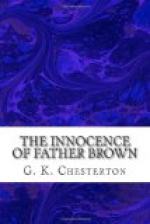he was writing, which was all about how some Indian
hermit made an English colonel kill himself by thinking
about him. He showed me the last sheets, and
even read me the last paragraph, which was something
like this: “The conqueror of the Punjab,
a mere yellow skeleton, but still gigantic, managed
to lift himself on his elbow and gasp in his nephew’s
ear: `I die by my own hand, yet I die murdered!’”
It so happened by one chance out of a hundred,
that those last words were written at the top of
a new sheet of paper. I left the room, and
went out into the garden intoxicated with a frightful
opportunity.
We walked round the house; and two more things happened in my favour. You suspected an Indian, and you found a dagger which the Indian might most probably use. Taking the opportunity to stuff it in my pocket I went back to Quinton’s study, locked the door, and gave him his sleeping draught. He was against answering Atkinson at all, but I urged him to call out and quiet the fellow, because I wanted a clear proof that Quinton was alive when I left the room for the second time. Quinton lay down in the conservatory, and I came through the study. I am a quick man with my hands, and in a minute and a half I had done what I wanted to do. I had emptied all the first part of Quinton’s romance into the fireplace, where it burnt to ashes. Then I saw that the quotation marks wouldn’t do, so I snipped them off, and to make it seem likelier, snipped the whole quire to match. Then I came out with the knowledge that Quinton’s confession of suicide lay on the front table, while Quinton lay alive but asleep in the conservatory beyond.
The last act was a desperate one; you can guess it: I pretended to have seen Quinton dead and rushed to his room. I delayed you with the paper, and, being a quick man with my hands, killed Quinton while you were looking at his confession of suicide. He was half-asleep, being drugged, and I put his own hand on the knife and drove it into his body. The knife was of so queer a shape that no one but an operator could have calculated the angle that would reach his heart. I wonder if you noticed this.
When I had done it, the extraordinary thing happened. Nature deserted me. I felt ill. I felt just as if I had done something wrong. I think my brain is breaking up; I feel some sort of desperate pleasure in thinking I have told the thing to somebody; that I shall not have to be alone with it if I marry and have children. What is the matter with me? ... Madness ... or can one have remorse, just as if one were in Byron’s poems! I cannot write any more.
James Erskine Harris.
Father Brown carefully folded up the letter, and put it in his breast pocket just as there came a loud peal at the gate bell, and the wet waterproofs of several policemen gleamed in the road outside.




